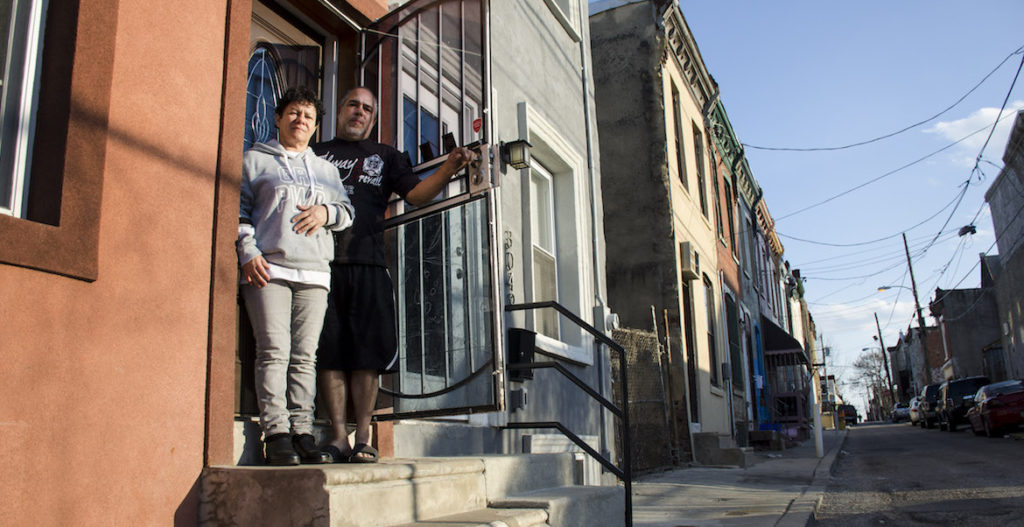Irma Cabrera and her family did not need to imagine the damage that Maria inflicted on their home. From their neighbor’s balcony, they witnessed every single furious wind that tore apart their roof. The cluster of residencies where they lived, nestled in a valley in Comerío, a municipality located deep in the central mountainous area, was the site of extensive devastation.
Prefer the audio version of this story? Listen to this article on CitizenCast below:
“No one came to help us,” Irma says. No government workers, volunteers, or rescue teams arrived in the weeks after the storm to their community hidden away between Puerto Rico’s vast mountain range, which had been razed and browned by Maria’s lashing gusts. Their barn was completely destroyed, and many of their hens and roosters perished.
Although Jurabe, Irma’s husband, had laid new zinc plates on the house’s roof, the rainwater still trickled in through the ceiling. Most of them had flown away, and with them, many of their belongings. Their landlord refused to fix anything up, instead announcing to them that they had to leave their residence permanently. In the absence of running water, they bathed in rivers and filled up empty, plastic gallons to use for drinking.
At the Lillian Marrero branch of the Free Library, Irma and her family receive help on the weekends to fill out housing applications and FEMA requests at a pop-up evacuee crisis center set up by local community leaders and activists. Here, Irma has made friends with the other evacuees and bonded with them about their situation.
The factory where Jurabe worked provided them with some cash to buy food and survive in the weeks after the storm. But in the landscape of dullness that Maria had left in its wake, Jurabe decided to leave to Philadelphia. He believed a better life awaited them there, and his stepmother and her relatives already lived and worked there. There was nothing to lose.
Jurabe began to apply to jobs through an agency as soon as he arrived to the city. He quickly got a night gig, but the schedule and wages were too low to be sustainable. Most of the money went towards commuter costs.
Her family was one of the lucky few who got compensation while still in Puerto Rico for the hurricane’s damages, but the cash was not anywhere close enough to cover what they had lost. Irma saved those $2,000, and the money was used to pay rent. The funds have by now dwindled.
Jurabe was employed at U-Haul in January. He has managed to cut down commute costs, since one of their next-door neighbors takes him to work every day. However, a pinched nerve in his leg is causing him constant distress and pain, a malady greatly induced by the chronic stress and the time he spent sleeping on the floor. Irma has pain in the shoulders, and is suffering from muscles spasms and tensions. When she is not looking for housing, she is in physical therapy.
Irma would like to return to Puerto Rico eventually. Her nearly 100-year-old father and 80-year-old mother still live there, under the care of Irma’s sister. It is where her roots lay. But “here we have nothing, and there we were left with nothing.”
Jurabe and Irma are both receiving medical care. However, both have been informed by their medical providers that their afflictions are directly related to the conditions and trauma of their current situation. Often, after work, Jurabe collapses into bed in pain and rests his leg. By their beds, there is a family-sized pack of advil glued to the wall.
The family cannot go back. They also cannot seem to settle here.
Alexis,16, and Alejandra,14, are attending a historically Puerto Rican public school, where many of Maria’s younger victims have also been enrolled. However, they are receiving marks significantly below their academic performance back in Puerto Rico. “Everything is different here, and Alexis in particular doesn’t like it at all. They just can’t get used to it,” Irma says.
Irma spend hours every day walking around North Philadelphia, calling the numbers on the houses and apartments she finds are up for rent. Like many Puerto Rican evacuees, she is having difficulty finding a home with affordable rent that could fulfill her family’s needs. Often, what fits the price range is a one bedroom, which cannot accommodate them. She knows how to use the buses, but the search can’t stray from the area where they currently live, because “we need to live near where Jurabe works. The homes on the internet are farther away,” Irma explains.
Her daily walks have familiarized her with her new neighborhood. Irma is glad she has an understanding of her new geography, but she has no one to share it with. “After school and after work, we stay inside the entire day,” she says. They are too tired, too stressed, and too broke to enjoy the city.
And every day, she feels more pressure to find a new place for Jurabe, Alejandra, Alexis and herself. While her husband’s stepmother has been supportive, sharing a house with multiple relatives they’ve never lived with before is challenging. They have to coordinate bathroom, kitchen, and laundry machine use in ways which work for everyone. They have other family members in the city but “everyone has their own lives,” says Irma. They have been too busy trying to survive to spend a lot of time with their own folks.
Irma would like to return to Puerto Rico eventually. Her nearly 100-year-old father and 80-year-old mother still live there, under the care of Irma’s sister. It is where her roots lay. But “here we have nothing, and there we were left with nothing.” And so, Irma wakes up the next morning, to look for a new life.

